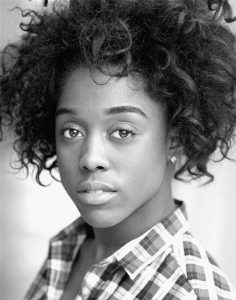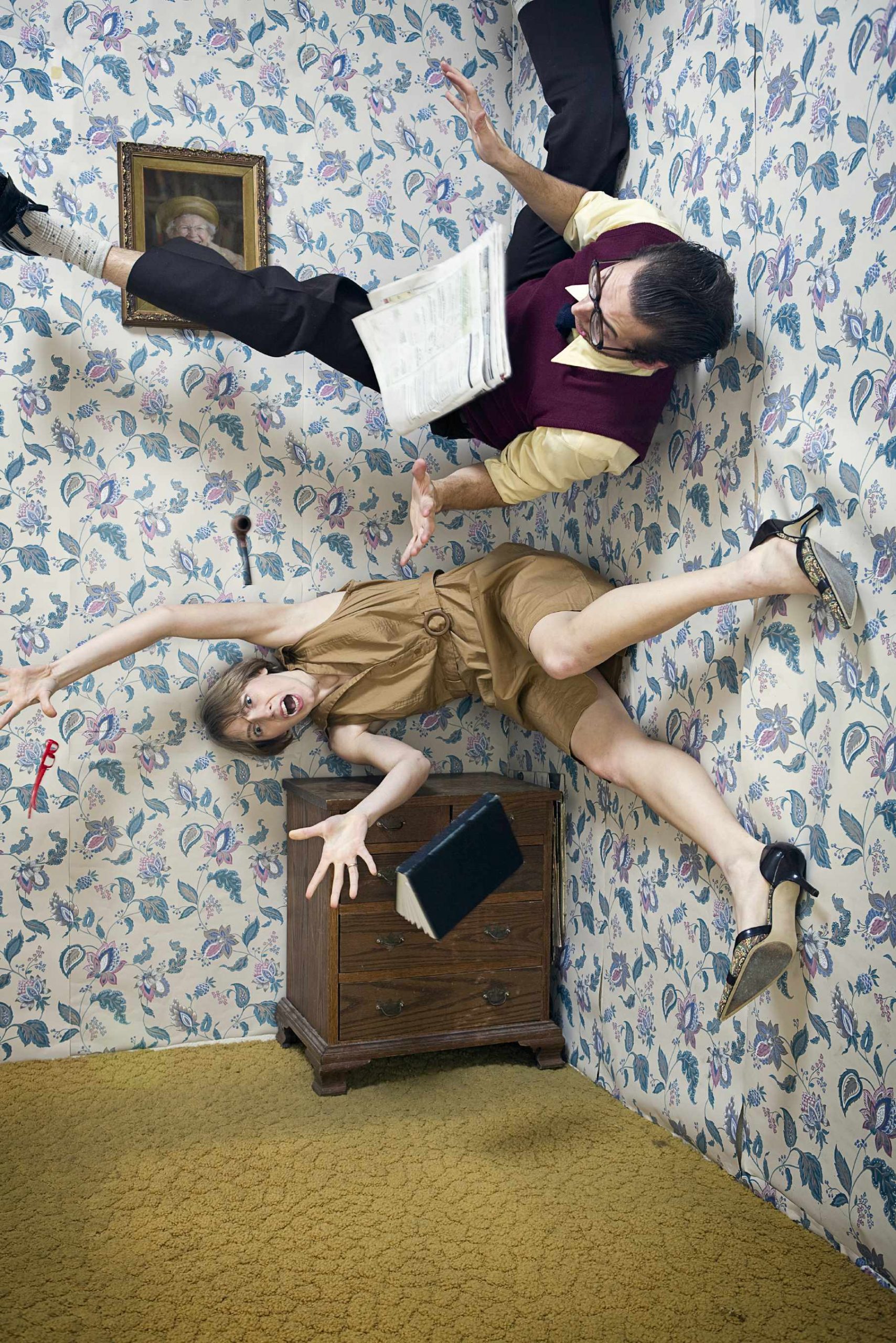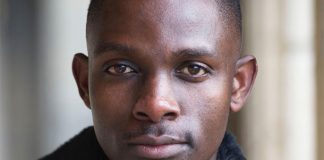
Lashana Lynch is a disciple of details. In her quest to portray an Olympic runner in 2012 film Fast Girls the London actress and singer endured a gruelling training programme to transform herself into the ultimate athlete. As we discuss her role in new play Dog Days, Lynch reveals she has formulated a back story for her character Hayley and it’s certainly thorough!
Clearly ambitious, Lynch puts a great deal of her motivation down to her upbringing, particularly the guidance and love of her Nan. As a young artist, Lynch is passionate about representing the unrepresented; something central to this new work.
How would you describe your character in Dog Days?
I play Hayley, the girlfriend of Tony and she’s a ditzy south London girl. Not the sharpest tool in the box, but she has quite an interesting over reactive brain. She comes out with these strange lines and experiences from her life; she’s had a troubled childhood actually. But she’s also pregnant, so as the play progresses you see a shift almost in her mentality; less shallow and less dependent on her boyfriend and more forward thinking. She’s a whirlwind. It’s a cockney accent which I’ve never played before but it’s interesting and enjoyable to see her develop.
Did you base Hayley on anyone in particular?
Not especially. I thought of people from high school who would speak out of turn and be blasé with their words. She’s 27 but has a young mentality so that fitted. Also, I didn’t have a troubled childhood but I grew up with my Nan and so did she I decided. Even though Hayley’s mentally young she believes she’s older than she is in her mind, so growing up with her Nan and possibly growing up a bit faster than other people made sense. There’s so much meat in the script and she’s such a well-drawn character, but you’ve always got to have a back story and I’m anal about that. I wanna know where she’s from, what shopping she did the night before, who her last text was from. These are all things that the audience won’t think about but I need to know in order to play a character as best I can.
What effect do you think growing up with your own Nan had upon you?
She was the core of my wisdom today. She taught me from an old fashioned perspective how to be a lady, how to conduct yourself around adults, how to have respect for yourself and for others and how to represent yourself as the best young black woman you can be. For me she was the epitome of greatness. Of coming to this country from Jamaica and deciding ‘I’m going to buy a house, raise my children, have a good life and make things work for me.’ She was like a second mum to me and I don’t feel disrespectful to my mum saying that, because she was from the other family side and she was like a second mum to her as well. She taught me my history and my potential and I think it’s vital that there’s someone who can take you on your journey from a historical perspective. She’s not here today but her spirituality, her beliefs, her sayings like “Get cracking” in the morning, are all things that I practice today and it’s because of her that I can say I’m the woman I am today.
Where do you think most of the comedy comes in with regards to the play?
It has to be pointed out that it’s a dark comedy. For me whatever the type of comedy it is, it always comes from the truth. If you’re not coming from the truth the laughs just come across as eggy and disingenuous. Annie Hulley the writer has executed it so well; it’s her first play and she’s written it in such a witty and specific way. So a lot of the comedy comes from the lines; they’re so punchy and specific to the character. She’s given you the meat there and it’s your job to cook it in the best way you know how.
Didn’t Annie Hulley write it as a response to there being a lack of roles for older actresses?
Yeah, and I was speaking to her about this yesterday, about being underrepresented. I’m a writer myself and funnily enough two years ago I had a little short of mine on at Theatre 503. I thought that young black females; educated females who enjoyed school and loved words and loved expressing themselves through books and poetry were underrepresented. And Annie has done exactly the same thing. She’s an older actress, she’s had a good career but it gets to this point when you’re older that unless you’re Meryl Streep you just don’t get interesting parts. Aside from true stories, you don’t really represent older females on the stage in a main role. Annie saw where she was underrepresented and she ran with it.
What was your play called?
It was called Cross Words and it was about a young girl called Naomi. She’s a poet and finishing school and one day this guy called Razor comes along and he tries to chat her up at the bus stop. She’s not interested, but as they speak more and more she realises he’s intelligent and creative with his words and they fall in love. There’s other little pockets of stories going on, but it’s mainly about dealing with stereotypes and shattering them to pieces.
It’s mentioned in the press release that you’re a part of a mixed couple. Is that a significant part of the play?
When we first did a reading I didn’t even think about the fact that I was the only black person in the cast. Annie didn’t see any problem with any colour playing the role. I personally never see a white guy with a black girl on stage; a black guy with a white girl or a mixed race girl with a white guy perhaps. In the industry I think it’s unusual to see it depicted on stage, to see it on screen is unheard of. Socially, unless you’re old fashioned or racist I don’t think it should stand out as odd. One day there’ll just be a black couple on stage and nobody will bat an eyelid or draw attention to it.
You’re also a singer. What do you mainly sing?
I always write my own stuff, it’s a fusion of soul, jazz and experimental. It’s a soul vibe really. I haven’t really been singing over the past year or so because I’ve been focusing on my acting and I have a problem with multitasking! Usually I write the lyrics and I meet with guitarists, pianists and drummers. I find that best represents my music, I don’t like artificial sounds. So yeah, hopefully more to come soon! I sang before I acted; I sang when I was in primary school and I did singing at Sylvia Young; no acting at all. But it was my singing teacher, Ray who said “You can’t not act when you sing, the two come hand I hand.” So I took up acting during my GCSEs and that’s led on to me going to drama school.

Fast Girls was your film debut. Was the Olympics a big deal to you?
I was sceptical about it at the beginning. It was such a long lead up it was almost like it was never gonna happen. When it was announced it felt like it was a big fuss over nothing. Having said that I did a bit of athletics at school, so I don’t really know why I thought that. I think sometimes London tries to make carbon copies of things and I thought ‘If you’re gonna do this, do it properly’ and thankfully they delivered. The opening ceremony was brilliantly directed by Danny Boyle. Very creative putting in the NHS and everything else, so I thought we were well represented as a country. Also bringing it here, I think our team felt like they had the country’s support. Just the roars from the crowd were crazy because they were cheering for their own. It was just incredibly patriotic.
How was your first experience of filming for the big screen?
It was brilliant. To be able to prepare for a film by getting into your character through your body was an absolute blessing. To be able to train with Olympians like Jeanette Kwakye and Shani Anderson was amazing. It was strange because we weren’t ourselves anymore. We weren’t just hopping on stage and pretending to be these runners; we were training six days a week, our diets changed, our bodies changed and I had to learn to hurdle. Our lives changed and so our mind-sets changed, so when we got on set it was as though we were these athletes that just happened to have cameras around us. I had a couple of people ask me at screenings “So you’re an athlete, how did you get into acting?” Brilliant! My job’s done! If I can convince you I’m the person on the screen then I’m proud. It was a warm cast, we were all females which is so rare and you had women of colour all on the same screen and walking down the red carpet was like ‘Yes! Look at us, we’re doing it!’ It was a great experience and it taught me a lot about filming.
Why should people come and see Dog Days?
Because it’s a brilliant piece of new writing that represents many things that a lot of theatregoers and a lot of actors miss in theatre scripts. The comedy is written beautifully, the characters are drawn out beautifully and it’s not just a comedy, it touches on a lot of serious every day and wider issues. It’s like looking through a keyhole and you’re being let into their life in a perfectly comedic and thought provoking way.


























